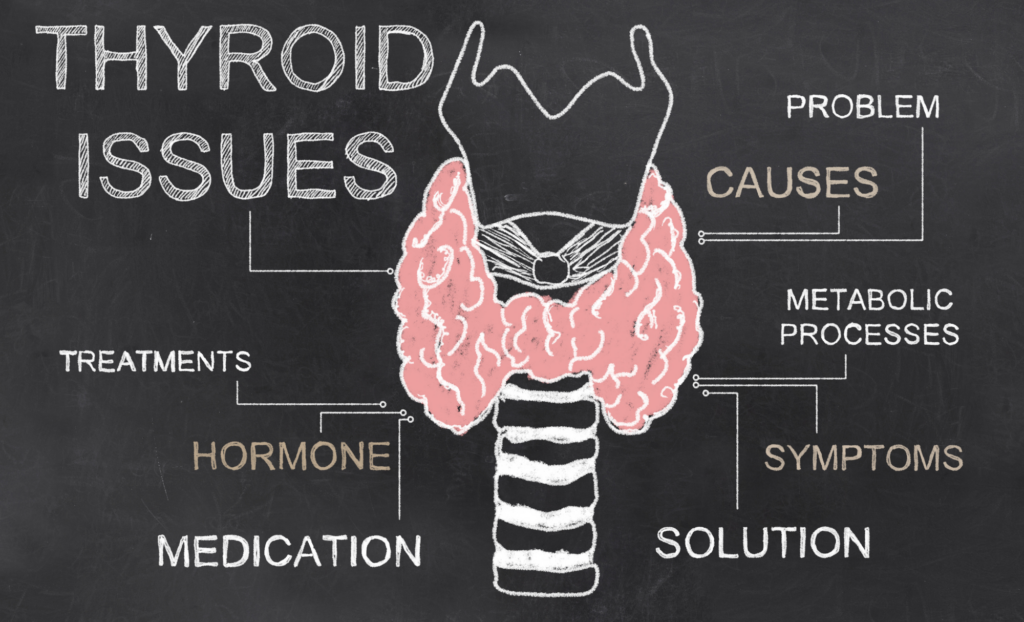
Did you know that over 20 million Americans are living with a thyroid disorder, and many of them don’t even realize it? The thyroid, a small butterfly-shaped gland located in your neck, plays a massive role in regulating your body’s energy, metabolism, and overall health. When it’s not functioning properly, it can have a significant impact on your well-being.
January is Thyroid Awareness Month, a time dedicated to spreading knowledge about the vital role of the thyroid gland and raising awareness about common thyroid disorders. From hypothyroidism to hyperthyroidism, understanding the signs and symptoms of thyroid problems is the first step toward better health.
In this post, we’ll explore what the thyroid does, the importance of thyroid hormones, common disorders, and how to maintain thyroid health. Let’s dive in and uncover how this small but powerful gland impacts your wellness and what you can do to keep it in check.
What is the Thyroid?
The thyroid is a small, butterfly-shaped gland located at the base of your neck, just below your Adam’s apple. Despite its size, the thyroid plays a powerful role in regulating many of the body’s essential functions. It produces and releases hormones that influence metabolism, energy levels, body temperature, and even heart rate.
The thyroid is part of the endocrine system, a network of glands responsible for producing hormones that communicate with and regulate various bodily processes. By secreting two primary hormones, triiodothyronine (T3) and thyroxine (T4), the thyroid acts as a control center, ensuring that your body’s systems run smoothly and efficiently.
This gland’s importance extends beyond energy and metabolism—it also supports growth, brain development, and the health of your heart, muscles, and bones. When the thyroid isn’t working correctly, it can disrupt the balance of these processes, leading to noticeable changes in how you feel and function.
Understanding the thyroid’s role is key to appreciating its impact on overall health. Keeping this vital gland healthy is an important step in maintaining balance and wellness throughout your body.
Importance of Thyroid Hormones
The thyroid gland produces two key hormones—triiodothyronine (T3) and thyroxine (T4)—that are essential for maintaining the body’s equilibrium. These hormones affect almost every cell and organ, making them critical for overall health and well-being.
Regulating Metabolism
Thyroid hormones play a central role in metabolism, influencing how your body converts food into energy. They determine your metabolic rate, which impacts weight management, energy levels, and body temperature.
Supporting Growth and Development
In children, thyroid hormones are crucial for normal growth and brain development. A healthy thyroid ensures that bones, muscles, and the nervous system develop properly during early life stages.
Maintaining Heart and Muscle Function
Thyroid hormones help regulate heart rate, ensuring it beats at a steady pace. They also influence muscle strength and contraction, contributing to physical performance and overall stamina.
Balancing Other Hormones
Thyroid hormones interact with other hormones in the body, including those that regulate calcium levels, stress response, and reproductive health. An imbalance can have cascading effects on various systems.
The Role of Iodine
Iodine is a key building block for thyroid hormones. Without adequate iodine, the thyroid cannot produce sufficient T3 and T4, leading to disorders like goiters or hypothyroidism. While iodine deficiency is less common in developed countries due to iodized salt, it remains a global health concern.
When thyroid hormone levels are too high (as in hyperthyroidism) or too low (as in hypothyroidism), it can disrupt multiple bodily functions, causing a range of symptoms from fatigue and weight gain to anxiety and rapid heart rate. Monitoring thyroid health and hormone levels is essential for maintaining overall wellness.

Common Thyroid Disorders
The thyroid gland, while small, is susceptible to a range of disorders that can significantly affect overall health. Recognizing these conditions is vital for early diagnosis and effective treatment. Here are some of the most common thyroid disorders:
Hypothyroidism (Underactive Thyroid)
- Symptoms: Fatigue, weight gain, cold intolerance, dry skin, hair thinning, and depression.
- Causes: Often caused by Hashimoto’s thyroiditis, an autoimmune condition where the immune system attacks the thyroid.
- Treatment: Typically managed with synthetic thyroid hormone replacement (levothyroxine).
Hyperthyroidism (Overactive Thyroid)
Hyperthyroidism is the result of an overactive thyroid producing excessive hormones.
- Symptoms: Weight loss, rapid heartbeat, sweating, nervousness, irritability, and heat intolerance.
- Causes: Commonly caused by Graves’ disease, another autoimmune disorder, or thyroid nodules that overproduce hormones.
- Treatment: Options include medications to reduce hormone production, radioactive iodine therapy, or surgery.
Thyroid Nodules and Goiters
- Thyroid Nodules: Lumps or growths on the thyroid gland. While most are benign, some may be cancerous or overproduce hormones.
- Goiters: An enlarged thyroid, often due to iodine deficiency or underlying thyroid disorders.
- Symptoms: Visible swelling in the neck, difficulty swallowing or breathing (in severe cases).
- Treatment: Depends on the underlying cause and severity—ranging from observation to surgery.
Autoimmune Thyroid Disorders
- Hashimoto’s Thyroiditis: Leads to hypothyroidism due to the immune system attacking the thyroid.
- Graves’ Disease: Causes hyperthyroidism and may lead to symptoms like bulging eyes (exophthalmos).
Thyroid Cancer
- Symptoms: A lump in the neck, changes in voice, or difficulty swallowing.
- Treatment: Often involves surgery, radioactive iodine therapy, or targeted therapies.
Each thyroid disorder requires a unique approach to diagnosis and treatment. Early detection and intervention are key to managing symptoms and maintaining a healthy, balanced life. Regular check-ups and thyroid function tests can help identify these conditions before they progress.
Symptoms of Thyroid Problems
Thyroid disorders can affect nearly every aspect of your health, from metabolism to mood. Understanding the symptoms of thyroid problems is crucial for early detection and effective management. While symptoms vary depending on whether the thyroid is overactive (hyperthyroidism) or underactive (hypothyroidism), some common warning signs can help you recognize when something isn’t right.
Symptoms of Hypothyroidism (Underactive Thyroid)
When the thyroid doesn’t produce enough hormones, it can slow down many of the body’s processes. Common symptoms include:
- Fatigue and sluggishness.
- Unexplained weight gain.
- Sensitivity to cold temperatures.
- Dry skin and brittle nails.
- Hair thinning or hair loss.
- Constipation.
- Depression or low mood.
- Memory issues or difficulty concentrating (“brain fog”).
Symptoms of Hyperthyroidism (Overactive Thyroid)
An overactive thyroid speeds up the body’s processes, leading to symptoms such as:
- Rapid or irregular heartbeat.
- Unintended weight loss.
- Anxiety, nervousness, or irritability.
- Sweating or sensitivity to heat.
- Tremors in the hands or fingers.
- Difficulty sleeping (insomnia).
- Frequent bowel movements or diarrhea.
- Bulging eyes (in cases of Graves’ disease).
General Symptoms to Watch For
Certain symptoms may overlap or indicate other thyroid-related issues:
- Swelling in the neck (goiter or nodules).
- Hoarseness or changes in voice.
- Difficulty swallowing or breathing.
Thyroid symptoms often develop gradually and may be mistaken for stress, aging, or other health conditions. This is why regular thyroid function tests and check-ups are essential, especially for those with a family history or other risk factors.
If you notice persistent symptoms or experience a combination of these signs, consulting a healthcare provider can make all the difference in managing your thyroid health.

Thyroid Health and Wellness
Maintaining a healthy thyroid is vital for your overall well-being. While some thyroid disorders cannot be prevented, certain lifestyle habits can support thyroid function and promote overall health. Here are some practical tips to keep your thyroid in check:
Eat a Balanced Diet
A nutrient-rich diet is essential for thyroid health. Focus on incorporating foods that support thyroid function:
- Iodine: Found in iodized salt, seafood, and dairy products, iodine is crucial for thyroid hormone production.
- Selenium: Nuts, seeds, fish, and eggs are excellent sources of selenium, which helps protect the thyroid from oxidative damage.
- Zinc: Found in meat, shellfish, legumes, and whole grains, zinc supports hormone production and immune health.
Avoid excessive consumption of processed foods and be mindful of your iodine intake to prevent imbalances.
Manage Stress Levels
Chronic stress can disrupt hormonal balance, including thyroid hormones. Incorporate stress-reducing practices into your daily routine:
- Meditation or mindfulness exercises.
- Regular physical activity, such as yoga or walking.
- Adequate sleep to restore hormonal equilibrium.
Schedule Regular Check-Ups
Routine thyroid function tests, including TSH, T3, and T4 levels, can help identify issues early. If you have a family history of thyroid disorders or experience symptoms, discuss testing with your healthcare provider.
Avoid Smoking
Smoking can negatively affect thyroid function and exacerbate certain conditions like Graves’ disease or goiters. Quitting smoking benefits not only your thyroid but your overall health.
Be Cautious with Supplements and Medications
Some supplements and medications, like those containing high levels of iodine or biotin, can interfere with thyroid function or test results. Always consult with your healthcare provider before starting new supplements.
Stay Physically Active
Regular exercise supports a healthy metabolism and helps regulate hormones. Activities like walking, swimming, or strength training can improve energy levels and overall health.
Your thyroid influences nearly every system in your body, making it essential to prioritize its health. By adopting these wellness strategies and staying informed, you can help support optimal thyroid function and improve your quality of life.
Your thyroid plays a crucial role in keeping your body’s systems balanced and functioning smoothly. From regulating metabolism and energy to supporting heart and brain health, this small but mighty gland has a big impact on your overall well-being.
Thyroid Awareness Month is the perfect time to learn about common thyroid disorders, recognize potential symptoms, and adopt habits that support thyroid health. Whether it’s scheduling a thyroid function test, eating a nutrient-rich diet, or managing stress, small steps can lead to significant improvements in your health.
Stay informed and proactive about your thyroid wellness by signing up for our newsletter. You’ll receive valuable tips, resources, and updates to help you take control of your health journey. Join our community today and take the first step toward a healthier tomorrow.

Leave a Reply
You must be logged in to post a comment.